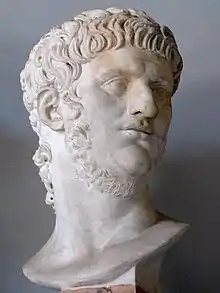Nero
Nero (Nerō Claudius Caesar Augustus Germanicus; 15 December 37 CE – 9 June 68 CE) was the fifth and last Roman Emperor of the Julio-Claudian dynasty. He was born Lucius Domitius Ahenobarbus.
| Nero | |||||
|---|---|---|---|---|---|
| Emperor of the Roman Empire | |||||
 Bust of Nero | |||||
| Reign | 13 October, 54 CE – 9 June, 68 CE | ||||
| Predecessor | Claudius | ||||
| Successor | Servius Sulpicius Galba | ||||
| Born | 15 December 5 Antium | ||||
| Died | 9 June 68 (aged 30) Outside Rome | ||||
| Burial | Mausoleum of the Domitii Ahenobarbi, Pincian Hill, Rome | ||||
| Wives |
| ||||
| Issue | Claudia Augusta | ||||
| |||||
| Dynasty | Julio-Claudian | ||||
| Father | Gnaeus Domitius Ahenobarbus | ||||
| Mother | Agrippina the Younger | ||||
Nero was the adopted son of his grand-uncle Claudius. He became emperor on 13 October 54, after Claudius died. Claudius was probably assassinated by Nero's mother Agrippina the Younger. Agrippina had motive in ensuring the succession of Nero before Britannicus (Claudius' natural son) could gain power.[1]
Nero as Emperor
.jpg.webp)
During his reign, Nero focused much of his attention on diplomacy, trade, and improving the cultural capital of the empire. He ordered the building of theatres and promoted athletic games.
His reign included a successful war and negotiated peace with the Parthian Empire; the suppression of a revolt in Britain; and the beginning of the First Roman–Jewish War.
In 64, most of Rome was destroyed in the Great Fire of Rome. In 68, the rebellion of Vindex in Gaul and later the acclamation of Galba in Hispania (Spain) drove Nero from the throne. Facing assassination, he died by suicide on 9 June 68.[2]
Nero's rule is associated with tyranny and extravagance.[3] He is known for a number of executions, including those of his mother,[4] wife (Claudia Octavia) and stepbrother.
Nero is known as the Emperor who played a fiddle while Rome burned. In reality, the violin had not yet been invented, Nero wasn't in Rome at the time, and when he heard of the fire he returned to direct relief efforts.
He also persecuted Christians. However, some ancient sources show that Nero was popular with the common people during and after his reign.
Sources
- Tacitus, Histories, I-IV (c. 105)
- Tacitus, Annals, XIII–XVI (c. 117)
- Josephus, War of the Jews, Books II-VI (c. 94)
- Josephus, Antiquities of the Jews, Book XX (c. 94)
- Cassius Dio, Roman History, Books 61–63 (c. 229)
- Plutarch, The Parallel Lives, The Life of Galba (c. 110)
- Philostratus II, Life of Apollonius Tyana, Books 4–5, (c. 220) Archived 2008-02-21 at the Wayback Machine
- Suetonius, The Lives of Twelve Caesars, the Life of Nero (c. 121)
Other sources
- Nero Nero:The Actor-Emperor
- Nero entry in historical sourcebook by Mahlon H. Smith
- Nero basic data & select quotes posted by Romans On Line
- Nero Caesar biographical sketch archived in Bible History Online
- Nero biography by Herbert W. Benario in De Imperatoribus Romanis
- Grant, Michael. Nero. New York: Dorset Press, 1989 (ISBN 0-88029-311-X).
- Nero Claudius Drusus Germanicus entry in the Illustrated History of the Roman Empire
- Griffin, Miriam T. Nero: The End of a Dynasty. New Heaven, CT; London: Yale University Press, 1985 (hardcover, ISBN 0-300-03285-4); London; New York: Routledge, 1987 (paperback, ISBN 0-7134-4465-7).
- Warmington, Brian Herbert. Nero: Reality and Legend (Ancient Culture and Society). London, Chatto & Windus, 1969 (hardcover, ISBN 0-7011-1438-X); New York: W.W Norton & Company, 1970 (paperback, ISBN 0-393-00542-9); New York: Vintage, 1981 (paperback, ISBN 0-7011-1454-1).
References
- Levick, Barbara. 1990. Claudius. Yale University Press. New Haven. p194
- Suetonius states that Nero committed suicide in Suetonius: The Lives of Twelve Caesars, Life of Nero 49; Sulpicius Severus, who possibly used Tacitus' lost fragments as a source, reports that it is uncertain whether Nero committed suicide: Sulpicius Severus, Chronica II.29, also see T.D. Barnes, "The Fragments of Tacitus' Histories", Classical Philology (1977), p. 228.
- Galba, during his rebellion, criticized Nero's luxuria, both his public and private excessive spending: Tacitus, Annals I.16; Kragelund, Patrick, "Nero's Luxuria, in Tacitus and in the Octavia", The Classical Quarterly, 2000, pp. 494–515.
- References to Nero's matricide appear in the Sibylline Oracles 5.49—520, Geoffrey Chaucer's Canterbury Tales The Monk's Tale, and William Shakespeare's Hamlet 3.ii.
Nero Born: 15 December 37 Died: 9 June 68 | ||
| Political offices | ||
|---|---|---|
| Preceded by Claudius |
Roman Emperor 54–68 |
Succeeded by Galba |
| Julio-Claudian dynasty 54–68 |
Dynasty ended | |